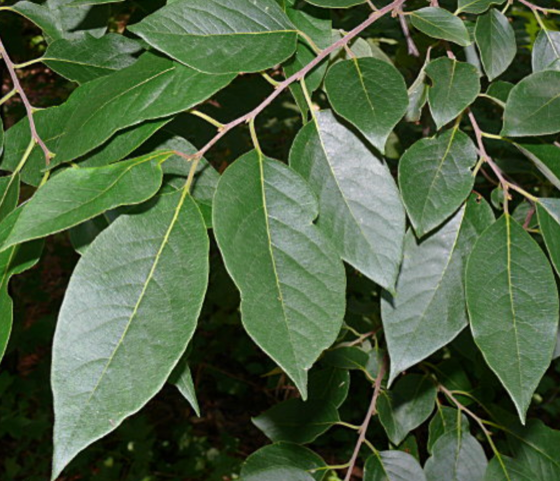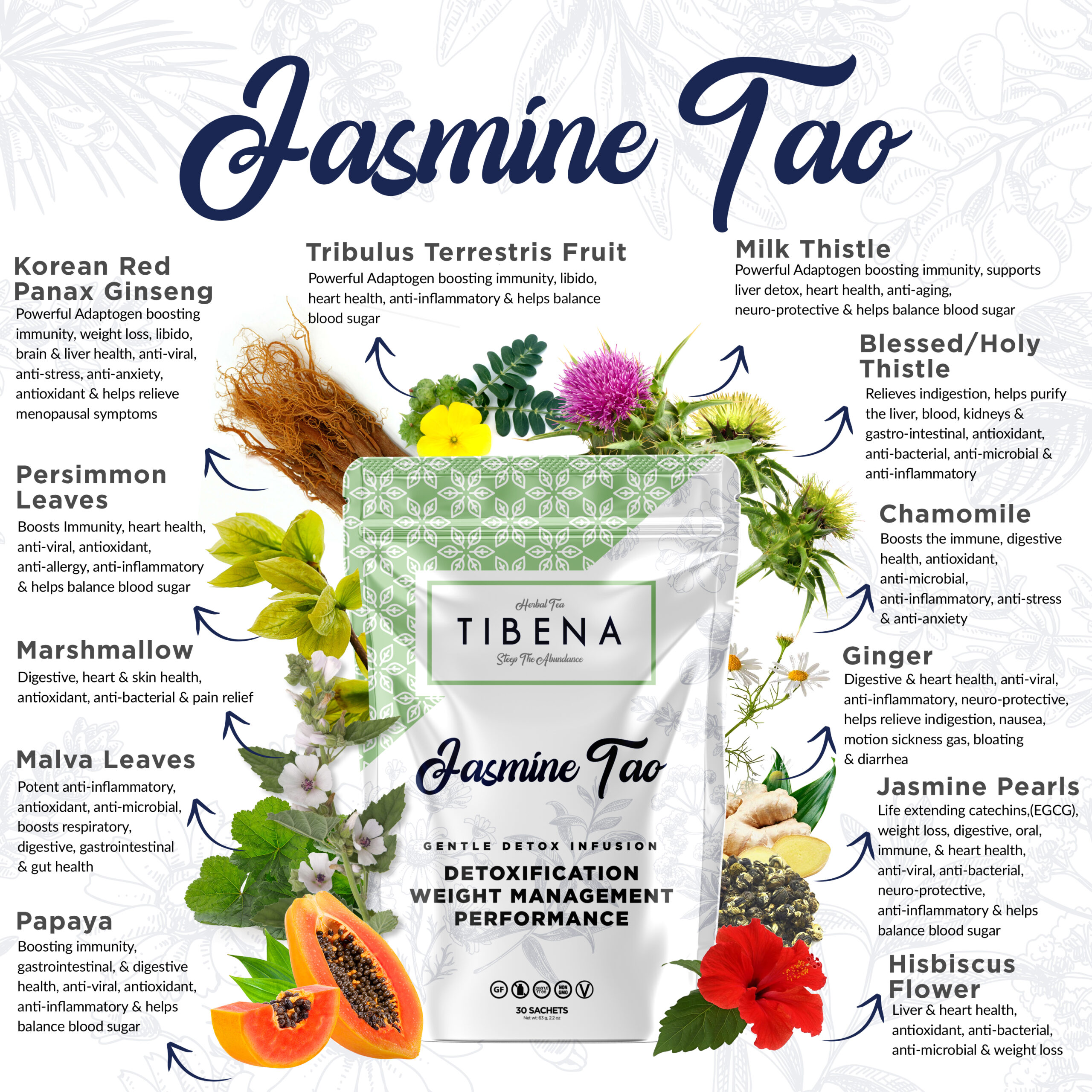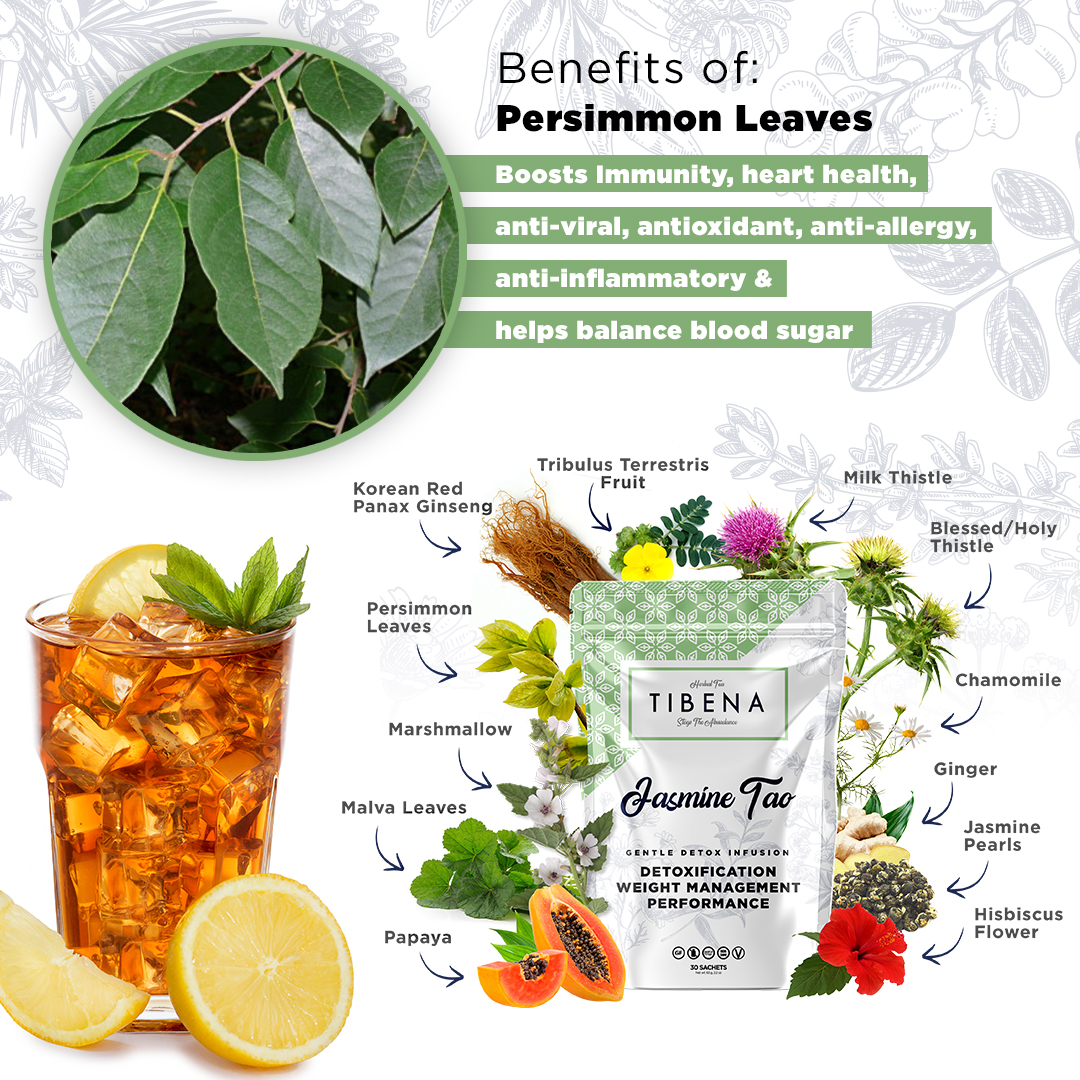
Studies have shown Potential Benefits:
Boost immunity, anti-viral, antioxidant, anti-allergy, heart health, anti-inflammatory & helps balance blood sugar
Persimmon Leaves
Persimmon leaves, botanically classified as Diospyros kaki, grow on deciduous trees and are members of the Ebenaceae family. Persimmon trees are predominately grown in Asia. The leaves are used in traditional medicine to help reduce symptoms of inflammation and boost immunity. They have traditionally been used as a phytomedicine, in health beverages to treat cardiovascular and respiratory disease and to promote maternal health in East Asia. In particular, polysaccharides from persimmon are known to have anti-coagulant, antioxidant, and immune-stimulatory activities. Persimmon leaves are high in fiber, vitamin C, amino acids, magnesium, and contain tannins which help digestion. Rich in polyphenols and proanthocyanidins. Persimmon leaves contain numerous bioactive compounds such as phenols, tannins, flavonoid oligomers, natural acids, ascorbic acid, caffeine and chlorophyll. Flavonoids in persimmon leaf including kaempferol, quercetin, and catechin demonstrate robust antioxidant activities and are associated with maintaining blood pressure. The polyphenols in persimmon leaf are broadly analyzed due to their anti-allergic, anti-inflammatory, and antibacterial properties. The major polyphenols in Diospyros kaki leaf are proanthocyanidins, which have vaso-relaxant and anti-hypertensive effects. Beside this, tannin is one of the major components of persimmon leaf, which has various functional properties such as anti-allergic, antibacterial, reducing blood pressure, and scavenging free radicals.


https://www.ncbi.nlm.nih.gov/pmc/articles/PMC3866758/?tool=pmcentrez – Anti-allergy, soothing for dermatitis
https://www.ncbi.nlm.nih.gov/pubmed/20622463 – Antioxidant rich in polyphenols & proanthocyanidins These results indicate that persimmon leaf tea containing peculiar proanthocyanidins has a significant role in suppressing blood glucose elevation after starch intake
https://www.ncbi.nlm.nih.gov/pmc/articles/PMC6073770/ – Bone health
https://www.ncbi.nlm.nih.gov/pubmed/20183282 – A novel C-glycosylflavone from the leaves of Persimmon (Diospyros kaki).Flavonoid C-glycosides significantly show antioxidant activity, anticancer and antitumor activity, hepatoprotective activity, anti-inflammatory activity, anti-diabetes activity, antiviral activity, antibacterial and antifungal activity, and so on.
https://www.ncbi.nlm.nih.gov/pubmed/12490237– Potent free radical scavenging effect of Persimmon leaves
https://www.ncbi.nlm.nih.gov/pmc/articles/PMC4492556/ – Persimmon Leaves may be useful for improving blood circulation and reducing cardiovascular disease. Healthy Metabolism, Cardiovascular, High Blood Pressure, Lowers cholesterol (lipids)
https://link.springer.com/article/10.1007/s10068-015-0031-1 – Persimmon Leaves potential preventive of thrombosis
https://www.ncbi.nlm.nih.gov/pubmed/27507501 – Antioxidant benefits
https://koreamed.org/SearchBasic.php?RID=0124KJN/2003.36.2.133&DT=1 – Anti-Cancer benefits
https://www.ncbi.nlm.nih.gov/pmc/articles/PMC4464271/ –These results provided a rationale for the use of persimmon leaf tea for the maintenance of normal blood glucose levels in diabetic patients.
https://www.ncbi.nlm.nih.gov/pmc/articles/PMC6049757/ – Antioxidant properties in Persimmon Leaves
https://www.ncbi.nlm.nih.gov/pmc/articles/PMC6043534/ – Anti-cancer and Immune enhancing
https://www.ncbi.nlm.nih.gov/pubmed/25637828 – Review of Traditional Uses, phytochemistry, pharmacological, Anti-inflammatory, Immune health.
https://www.ncbi.nlm.nih.gov/pubmed/16651765 – Anti-microbial
https://www.ncbi.nlm.nih.gov/pubmed/31389482 – Helps in optimizing blood sugar, enhancing the level of blood hemoglobin. It is concluded that D. kaki (Persimmon Leaves) display a good source of nutrients and bioactive compounds that may contribute to its therapeutic benefits against the risk of disease complications.
https://pubmed.ncbi.nlm.nih.gov/23372851/ – Anti-viral
